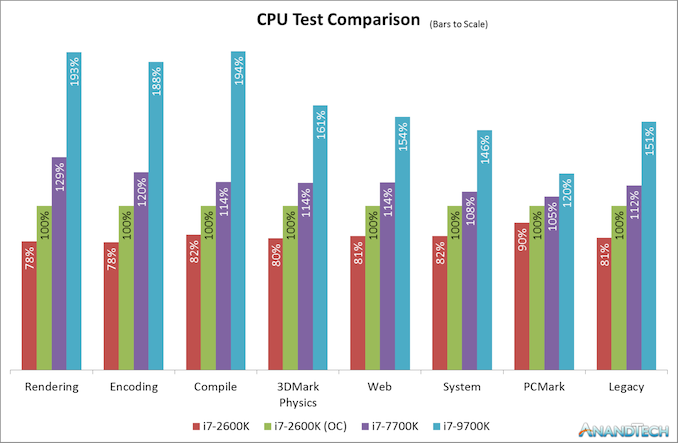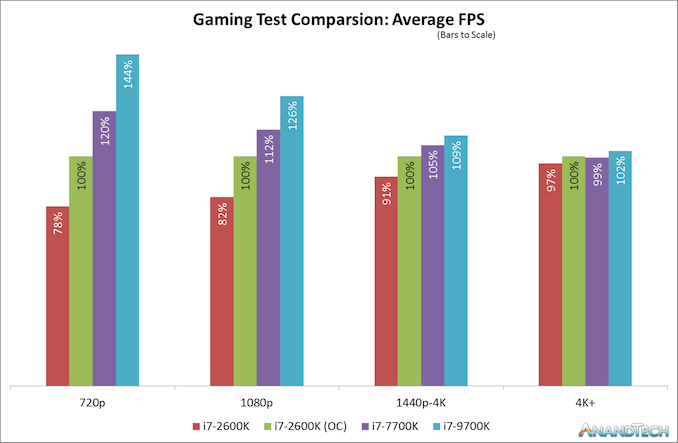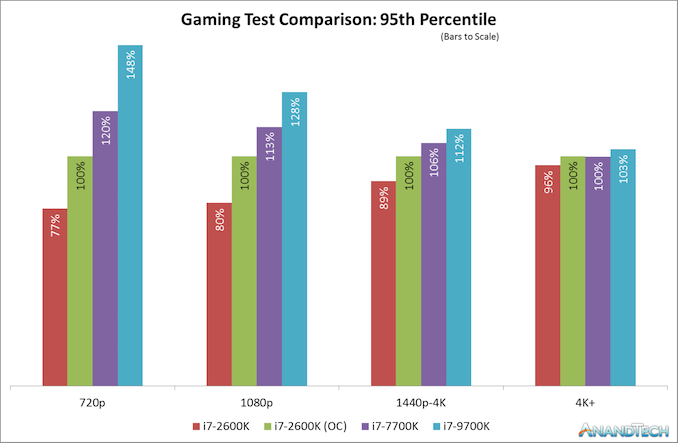Upgrading from an Intel Core i7-2600K: Testing Sandy Bridge in 2019
by Ian Cutress on May 10, 2019 10:30 AM EST- Posted in
- CPUs
- Intel
- Sandy Bridge
- Overclocking
- 7700K
- Coffee Lake
- i7-2600K
- 9700K
Comparing the Quad Cores: CPU Tests
As a straight up comparison between what Intel offered in terms of quad cores, here’s an analysis of all the results for the 2600K, 2600K overclocked, and Intel’s final quad-core with HyperThreading chip for desktop, the 7700K.
On our CPU tests, the Core i7-2600K when overclocked to a 4.7 GHz all-core frequency (and with DDR3-2400 memory) offers anywhere from 10-24% increase in performance against the stock settings with Intel maximum supported frequency memory. Users liked the 2600K because of this – there were sizable gains to be had, and Intel’s immediate replacements to the 2600K didn’t offer the same level of boost or difference in performance.
However, when compared to the Core i7-7700K, Intel’s final quad-core with HyperThreading processor, users were able to get another 8-29% performance on top of that. Depending on the CPU workload, it would be very easy to see how a user could justify getting the latest quad core processor and feeling the benefits for more modern day workloads, such as rendering or encoding, especially given how the gaming market has turned more into a streaming culture. For the more traditional workflows, such as PCMark or our legacy tests, only gains of 5-12% are seen, which is what we would have seen back when some of these newer tests were no longer so relevant.
As for the Core i7-9700K, which has eight full cores and now sits in the spot of Intel’s best Core i7 processor, performance gains are very much more tangible, and almost double in a lot of cases against an overclocked Core i7-2600K (and more than double against one at stock).
The CPU case is clear: Intel’s last quad core with hyperthreading is an obvious upgrade for a 2600K user, even before you overclock it, and the 9700K which is almost the same launch price parity is definitely an easy sell. The gaming side of the equation isn’t so rosy though.
Comparing the Quad Cores: GPU Tests
Modern games today are running at higher resolutions and quality settings than the Core i7-2600K did when it was first launch, as well as new physics features, new APIs, and new gaming engines that can take advantage of the latest advances in CPU instructions as well as CPU-to-GPU connectivity. For our gaming benchmarks, we test with four tests of settings on each game (720p, 1080p, 1440p-4K, and 4K+) using a GTX 1080, which is one of last generations high-end gaming cards, and something that a number of Core i7 users might own for high-end gaming.
When the Core i7-2600K was launched, 1080p gaming was all the rage. I don’t think I purchased a monitor bigger than 1080p until 2012, and before then I was clan gaming on screens that could have been as low as 1366x768. The point here is that with modern games at older resolutions like 1080p, we do see a sizeable gain when the 2600K is overclocked. A 22% gain in frame rates from a 34% overclock sounds more than reasonable to any high-end focused gamer. Intel only managed to improve on that by 12% over the next few years to the Core i7-7700K, relying mostly on frequency gains. It’s not until the 9700K, with more cores and running games that actually know what to do with them, do we see another jump up in performance.
However, all those gains are muted at a higher resolutions setting, such as 1440p. Going from an overclocked 2600K to a brand new 9700K only gives a 9% increase in frame rates for modern games. At an enthusiast 4K setting, the results across the board are almost equal. As resolutions are getting higher, even with modern physics and instructions and APIs, the bulk of the workload is still on the GPU, and even the Core i7-2600K is powerful enough for it. There is the odd title where having the newer chip helps a lot more, but it’s in the minority.
That is, at least on average frame rates. Modern games and modern testing methods now test percentile frame rates, and the results are a little different.
Here the results look a little worse for the Core i7-2600K and a bit better for the Core i7-9700K, but on the whole the broad picture is the same for percentile results as it is for average frame results. In the individual results, we see some odd outliers, such as Ashes of the Singularity which was 15% down on percentiles at 4K for a stock 2600K, but the 9700K was only 6% higher than an overclocked 2600K, but like the average frame rates, it is really title dependent.













213 Comments
View All Comments
Targon - Monday, May 13, 2019 - link
I made a similar comment, Civ6 added a new benchmark with Gathering Storm as well that is even more resource intensive. Turn length will show what your CPU can do, without GPU issues getting in the way.Zoomer - Friday, June 14, 2019 - link
Articles says that bmrk is being developed.nonoverclock - Friday, May 10, 2019 - link
Interesting article! I'm still sitting on an i7 4770 and am debating an upgrade, would be also interesting to see a Haswell i7 in the mix.HomerrK - Friday, May 10, 2019 - link
I'm one of those who bought the 2600K back in the day. A few months ago I made the move to the 9900K. Cores and price don't matter so much as feeling it will be a chip that will offer great bang for the buck for years. I think it is the spiritual successor to the 2600K and that it was a mistake to omit it.RSAUser - Saturday, May 11, 2019 - link
Not even close, it's near double the price.The Ryzen 2700 at $300 would be a way better "successor" as it's within a lot of people's budgets, offers good gaming performance and with 8 cores is probably going to last quite a while as we move to higher threading.
The Ryzen 2 chips moving to 7nm will probably have the largest leap in a while, so whichever one comes in around the $300 mark will probably be the "true" successor of the 2600K.
Targon - Monday, May 13, 2019 - link
The issue that some will have with the 2700X is that the clock speeds are not up there at the 5GHz mark, which is what many Intel systems have been able to hit for over four years now. Third generation Ryzen should get to the 5GHz mark or possibly beyond, so there wouldn't be any compromises. Remember, extra cores will only result in better performance in some areas, but single threaded and many older programs benefit more from higher clock speeds(with similar IPC).Don't get me wrong, I have a Ryzen 7 1800X in this machine and wouldn't step down to a quad-core chip again on the desktop, but I do appreciate that some things just want higher clock speeds. I expect a 40 percent boost in overall performance by switching from this 1800X to the 16 core Ryzen if it hits 5GHz, and that doesn't even count the increase in core count. I may end up paying $600 or more for the CPU though, but that will keep me happy for at least another five years.
crimson117 - Friday, May 10, 2019 - link
Finally retired my i5-2500K last spring for a Ryzen 2700X.But boy what a good run that CPU had.
jayfang - Friday, May 10, 2019 - link
Likewise only recently "demoted" my i5-2500K - still has tons of grunt as family PC / HTPCgijames1225 - Friday, May 10, 2019 - link
Same boat. I used a 2400k and 2500k for my two main PCs for years and years. Just replaced the 2500k with a Ryzen 5 1600 (they were $80 at Microcenter for some blessed reason). Tripling the thread count has down wonders for my compile times, but it's just amazing how strong and long lasting the IPC was on the 2ng generation Core i processors.qap - Friday, May 10, 2019 - link
You've convinced me. Staying with my Sandy Bridge for another year. At 1600p difference in CPU is not that high (definitely not worth 1000+ USD for completely new system) and for day to day work it is plenty fast. Up to four threads there's very little to gain and only when more threads are at play there is large enough difference (same goes for Ryzen only there I would gain almost nothing up to four threads).Perhaps Zen 2 will change that, or maybe 10nm CPUs from intel when they finally arrive with new CPU architecture and not rehash of 4 year old Skylake.